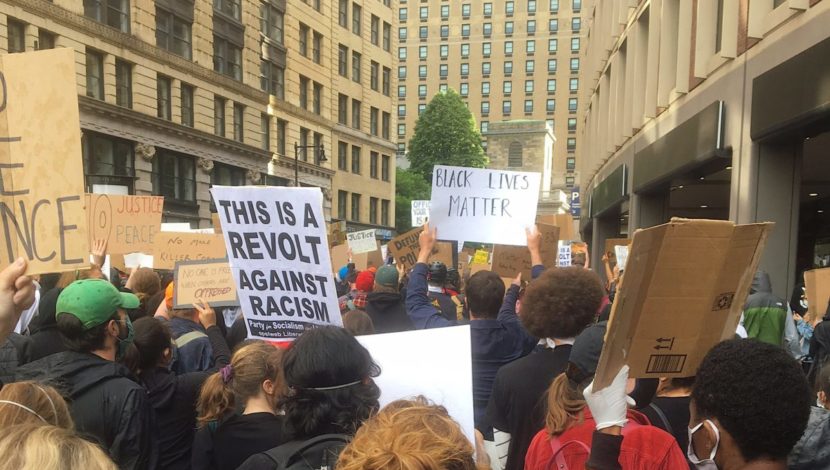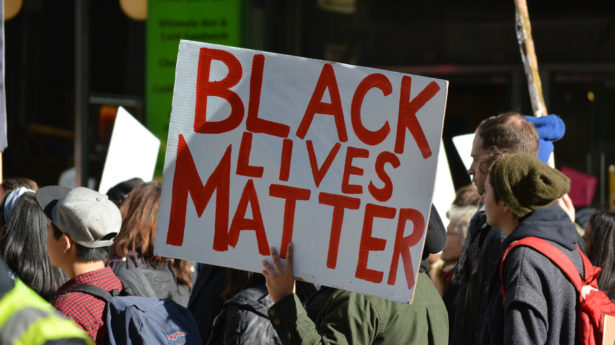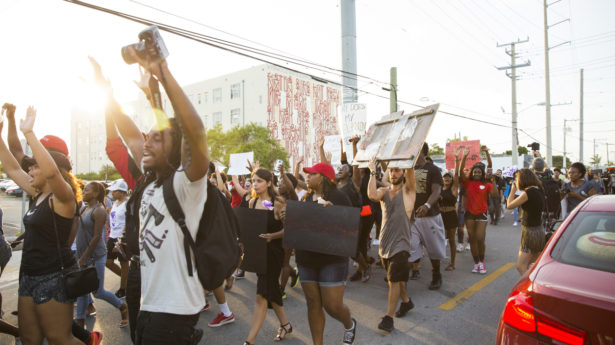The Unitarian Universalist Service Committee advances human rights through grassroots collaborations.
3 Vital Lessons George Floyd’s Murder and Juneteenth Teach All of Us

By UUSC Staff on June 19, 2020
Juneteenth is an unofficial holiday in the United States celebrated by Black Americans, and sadly, has yet to be declared a national holiday, though there have been increasing calls for this. Celebrated on June 19, the holiday commemorates the dissolution of chattel slavery at the end of the Civil War and the hope that so many Black Americans experienced when finally freed from forced servitude.
In the more than 150 years since the end of the Civil War, chattel slavery evolved, characterized by an oppressive and dehumanizing system that treated Black people as property to be bought, branded, sold, raped, beaten, and murdered. White supremacy and the culture it bred hundreds of years ago are still with us today.
Mass incarceration, income inequality, housing and food insecurity, disparities in access to quality education, and a tremendous wealth gap replaced chattel slavery as tools of oppression, segregation, and second-class citizenship.
While June 19 is a day to acknowledge the emancipation of Black people from the confines of chattel slavery in the 19th Century, the cretinous and callous murder of George Floyd on May 25 has only highlighted that injustice and the abject vileness of white supremacy are still ever-present in this nation.
Here are three lessons we’ve learned from Floyd’s murder and the celebration of Juneteenth:
1. The work isn’t over: The end of the Civil War in 1865; the Civil Rights movement in the late 1960s; and Barack Obama winning the 2008 presidential election are watershed moments in American history. But white supremacy culture and it’s monstrous offspring, racism, still exist. From Trayvon Martin to Tamir Rice, Sandra Bland to Breonna Taylor, Black people are still being lynched. Nooses around the neck are no longer necessary when a foot will do. Jails and prisons are disproportionately filled with Black men while Black children are routinely robbed of a quality education. Black people by and large have less access to quality healthcare while also suffering inordinately from lower wages and less wealth than their white counterparts. Housing insecurity and the fear of being homeless are monsters that regularly hide under the beds of many Black Americans. Until we get our house in order by exterminating the termites and cockroaches known as white supremacy and racial injustice, the foundation of our home—the United States of America—will never be stable.
2. Our attention spans must outlast the news cycle: Rage and heartbreak over the murder of George Floyd should live beyond the month of June. While anger can be dangerous, righteous anger—an anger born from systemic injustice and dehumanization—should perennially burn deep in our stomachs, hearts, and heads. The excruciating memory of eight minutes and 46 seconds of a slow march to a painful death should outlast any excitement we have about another Kardashian getting pregnant, any disappointment over a celebrity being overlooked for an Oscar nomination, or any viral cat video. If the abolishment of chattel slavery has taught us anything, it is that injustice always finds a way to combat the steps we take to move forward. Protests, vigils, and memes are powerful forms of vigilance that help unite us and keep the narrative of injustice in the public eye. But we need more. The work towards justice and equality is in the long and arduous task of fixing our systems and being vigilant in keeping them just. Which means…
3. We all can do better: UUSC as an institution has not explicitly declared itself anti-racist, though racism—and the noxious practice of being raced—threads its way through all of our work. We can do better and we must. If we as an institution can humble ourselves to acknowledge this mistake and commit to learning, growing, and committing ourselves to the uphill battle of advancing racial justice, can you? We owe it to the nearly four million enslaved people emancipated by July of 1865 and we owe it the man who spent the last eight minutes of his life fighting for his human right to breathe.
***
About UUSC: Guided by the belief that all people have inherent worth and dignity, UUSC advances human rights globally by partnering with affected communities who are confronting injustice, mobilizing to challenge oppressive systems, and inspiring and sustaining spiritually grounded activism for justice. We invite you to join us in this journey toward realizing a better future!
Photo Credit: Jennifer O’Rourke, UUSC Staff

